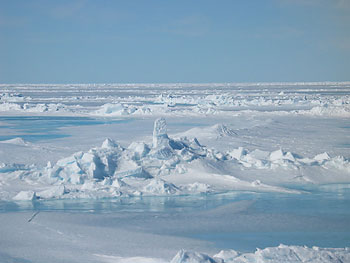Global warming destabilizing entire Arctic Ocean ecosystem
Scientists involved in the most comprehensive study of life in the oceans ever conducted have documented changes in species distribution in the polar regions as warmer oceans spur migration 
by Jessica Aldred Global warming is changing the distribution, abundance and diversity of marine life in the polar seas with "profound" implications for creatures further up the food chain, according to scientists involved in the most comprehensive study of life in the oceans ever conducted. Researchers from the Arctic Ocean Diversity (Arcod) project have documented rising numbers of warm-water crustaceans in the seas around Norway’s Svalbard Islands. Arcod is part of the Census of Marine Life, a huge 10-year project involving researchers in more than 80 nations that aims to chart the diversity, distribution and abundance of life in the oceans. They say an increasing number of these species are extending their range towards the poles as previously cold waters between Norway and the North Pole become warmer and more hospitable. … "We are finding two smaller species of plankton. This difference in size is big enough to cause a problem for the breeding populations of birds and whales as they will be forced to eat smaller species that has less energy content." … "In oceanographical terms these [Arctic] changes are huge," said Gradinger. "A change in temperature of just a few degrees will see the loss of sea ice cover and with it the sea ice algae, small animals and crustaceans which depend on it. By 2050 the arctic oceans may be ice free, we will lose these animals and that will have implications further up the food chain." "From an Arctic perspective it’s not only about an increase in temperature, it’s a complete change in the ecosystem – salinity, ice melt, flow, currents – all of these together will have an impact." …
Global warming ‘changing balance’ of marine life in polar seas